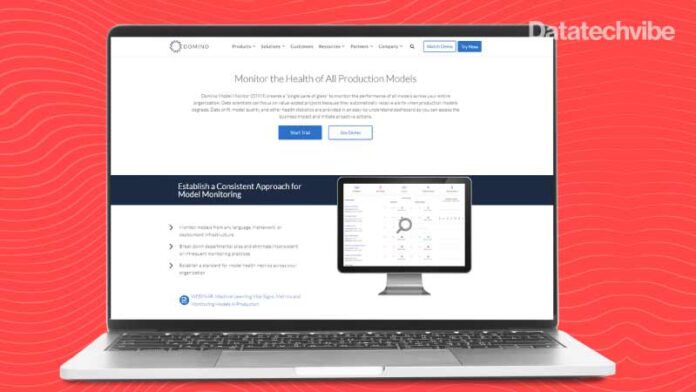Domino Data Lab, a provider of the leading Enterprise MLOps platform, announced a major upgrade to its model monitoring capabilities so companies can place greater trust in the models they deploy. This and other enhancements — including Domino Model Monitor (DMM) support for AWS, GCP, and Azure — are part of Domino 4.6.
New in this release, DMM can automatically compute data drift and model quality across billions of daily predictions, more than 100x the scale of previous versions. This is made possible by the new Domino Elastic Monitoring Engine, a groundbreaking technology advancement that scales model monitoring capacity infinitely to support the most demanding monitoring requirements. Customers gain broad visibility and control across a limitless number of models with hundreds or even thousands of features to help them avoid unwanted outcomes across their business.
A recent survey by Wakefield Research and Domino Data Lab revealed that 82 per cent of data executives at US companies with more than $1 billion revenue say their company leadership should be concerned that bad or failing models could lead to severe consequences for the company.
Further underscoring the need for visibility at scale, respondents said they worry that their models — if not monitored and maintained — could lead to a variety of unwanted outcomes including lost revenue or security, or compliance breaches.
DMM now supports a broad range of deployment options including major cloud platforms (AWS, GCP and Azure), as well as on-premises deployments. DMM can also now connect directly to Amazon S3 and Hadoop Compatible File Systems (HCFS), which include Azure Blob Store, Azure Data Lake (Gen1 and Gen2), Google Cloud Storage, and HDFS. This powerful new capability allows production data to be analyzed directly from its native storage location, eliminating the need to copy data from place to place with the potential to introduce version control, security, and other issues. By maintaining compatibility with a wide array of infrastructure options, companies can analyse more data and predict data drift and model quality issues with greater accuracy.
Expanding Self-Serve Distributed Compute
Domino 4.6 also introduces easily deployable access to Ray.io and Dask distributed compute frameworks, which along with existing Spark support, builds on Domino’s vision for allowing data scientists to work the way they want with the tools and infrastructure they need. Distributed computing allows data scientists to process large volumes of data for machine learning and other complex mathematical calculations such as deep learning.
Domino’s new DevOps-free support for the three most popular distributed compute frameworks at a true enterprise-scale is an industry first. Teams can select the best framework for the job at hand – without being limited to the single choice provided by other platforms – and then dynamically provision and orchestrate workloads directly on the infrastructure backing a Domino instance without the need for DevOps skills or IT intervention.
This added support also makes it easy for data science teams to leverage pre-packaged machine learning libraries and scale the data handling capacity of their applications with little or no changes to existing models.
Also Read: Which Tech Trends Will Impact Your Business?
Continuing to Evolve Enterprise MLOps
Domino 4.6 builds on the company’s mission to help the world’s most sophisticated companies solve the world’s most important problems by further breaking down silos and barriers to data science velocity. Additional features in Domino 4.6 include:
- Domino Certification of Amazon EKS. Amazon’s managed Kubernetes offering is now part of the “Certified” family of highly secure, comprehensively tested, and performance-optimized Domino offerings to streamline installation and upgrades.
- Git Repository Creation & Browsing with CodeSync. Users can now create Git repositories, then browse and edit their files easily – all without leaving the Domino environment.
- Read/Write Domino Datasets. Significant improvements in the user experience of Domino Datasets allow them to read, write, and share large amounts of data seamlessly across the entire Domino platform.
- Single Sign-On. Additionally, customers can leverage Single Sign-On (SSO) across the entire Domino Enterprise MLOps Platform for a seamless experience, from model development to deployment to monitoring.









